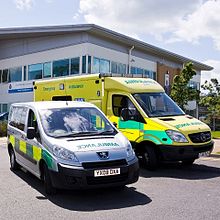East Midlands Ambulance Service
East Midlands Ambulance Service National Health Service (NHS) Trust (EMAS) provides emergency 999, urgent care and patient transport services for the 4.8 million people within the East Midlands region of the UK - covering Nottinghamshire, Derbyshire (except Glossop, Hadfield and Tintwistle), Leicestershire, Rutland, Lincolnshire (including North and North East Lincolnshire) and Northamptonshire.

| East Midlands Ambulance Service | |
|---|---|
| EMAS | |
 | |
 Area served by East Midlands Ambulance Service NHS Trust | |
| Type | Ambulance services trust |
| Established | 1999 |
| Headquarters | Nottingham, Nottinghamshire |
| Region served | Nottinghamshire, Derbyshire, Leicestershire, Rutland, Lincolnshire and Northamptonshire |
| NHS region | NHS England |
| Area size | 6,425 sq miles |
| Population | 4.8 million |
| Establishments | 70 sites including two control rooms |
| Budget | £158 million (2017/18) |
| Chair | Pauline Tagg MBE |
| Chief executive | Richard Henderson |
| Website | www |
Performance
In 2016/17, EMAS received over 938,837 emergency 999 calls with ambulance clinicians dispatched to 653,215 incidents.[1]
EMAS employs about 3,290 staff at more than 70 locations, including two control rooms at Nottingham and Lincoln - the largest staff group are those who provide accident and emergency responses to 999 calls.[1]
In 2013, EMAS took on 140 new emergency care assistants.[2] In 2014, EMAS announced they were bringing back the ambulance technician role.[3]
In 2010−11, EMAS missed key performance targets after a cold spell brought snow and ice.[4] By June 2015, EMAS had failed to meet their category 1 response times for the fifth successive year.[5]
In December 2019, ambulance staff spent 13,057 hours waiting at hospitals for the pre-handover of patients, more than double the time spend in December 2018.[6]
Funding
EMAS previously provided patient transport services until contracts worth £20 million per year were taken over in 2012 by two private sector companies.[7] In 2012−13, EMAS had a budget of £148M.[8] The trust spent £4.3M on voluntary and private ambulance services in 2013−14 for support in busy periods.[9]
In 2015, the service also faced a drop in annual funding of around £6M.[10]
In October 2014, the trust decided to spend £88,000 on upgrading its computer equipment.[11]
In 2018, the trust said it would need an extra £20M a year to meet the new ambulance performance standards.[12]
References
- East Midlands Ambulance Service NHS Trust (30 June 2018). "East Midlands Ambulance Service NHS Trust - Overview". nhs.uk. NHS. Retrieved 13 September 2018.
- "East Midlands Ambulance Service fined for third successive year". BBC News. 22 May 2013.
- "East Midlands Ambulance: Increase in paramedic stress". BBC News. 19 December 2014.
- "East Midlands Ambulance Service worst in England". BBC News. 23 June 2011.
- "East Midlands Ambulance Service miss targets for fifth year". BBC News. 16 June 2015.
- "Trust's ambulance crews lose 18 months waiting at hospitals". Health Service Journal. 14 January 2020. Retrieved 26 February 2020.
- "East Midlands Ambulance Service loses £130m contract". BBC News. 10 December 2011.
- "East Midlands Ambulance Service: Private ambulance surge defended". BBC News. 9 August 2013.
- "Nearly £8 million cost of private ambulances to cope with 999 demand". Leicester Mercury. 30 January 2015. Archived from the original on 8 February 2015. Retrieved 8 February 2015.
- Crowson, Isaac (31 October 2015). "Nigel Mills MP demands 'urgent action' from East Midlands Ambulance Service over response times". Derby Telegraph. Archived from the original on 13 December 2015. Retrieved 15 December 2015.
- "New computer systems for Nottinghamshire's ambulance service after 42,000 patients' files lost". Nottingham Post. 30 October 2014. Archived from the original on 1 December 2014. Retrieved 15 December 2015.
- "Ambulance trusts demand millions to meet new targets". Health Service Journal. 4 May 2018. Retrieved 13 August 2018.